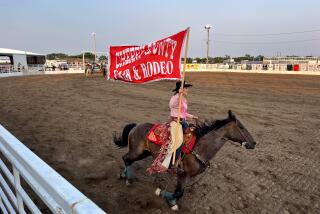In Home of Nation’s First Primary, With Responsibility Come Riches
- Share via
MANCHESTER, N.H. — For Elias Kourtis, presidential campaigns are something to savor, like the prime rib and lamb kebabs he plans to serve in abundance next winter at his Athens restaurant in downtown Manchester.
For restaurateur Richard Vareschi, the bumper crop of candidates descending on New Hampshire promises a rich and welcome harvest, like the fine French wines he plans to import for the occasion.
Every four years, as the country sets out to choose a president, this pint-sized state becomes the fulcrum of that process, hosting the first primary and culling the field of candidates for the rest of America to consider.
It’s an awesome responsibility--and a lucrative franchise.
A franchise protected by state law, which says that New Hampshire must always go first, and a custom celebrated in the state’s schoolbooks, which instruct every fourth-grader “to support and cherish this enduring tradition.”
It is a tradition that has helped shape history, humbling presidents and lifting longshots, and a ritual that has lent this state a weight all out of proportion to its meager slice of the nation’s population.
And it is an industry, zealously guarded, that boosts the mighty and meager, from governors gaining national stature to small-business owners, like Kourtis, forecasting an extra $2,000 to $3,000 in weekly business from the quadrennial rite.
French Wines and Expense Accounts
If you doubt the economic impact, stop by the palatial studios of Manchester’s WMUR-TV, known apocryphally as “the house Steve Forbes built,” in tribute to the publisher’s ad blitz during his unsuccessful 1996 White House bid.
Or ask Kourtis or Vareschi, who have their campaign strategies all mapped out. For Kourtis, whose Greek restaurant has been a Manchester mainstay for 20 years, it means longer hours and laying in extra supplies of prime rib and lamb.
Over at Richard’s Bistro, owner Vareschi plans to install a second phone line to accommodate reporters and will upgrade his wine list.
“They love French wines,” Vareschi said of the press who made his establishment their unofficial hangout four years ago. “They pay good money because most of them . . . are on expense accounts.”
New Hampshire’s lead status, however, is facing increased assault by other states who are jealous of the power and glory--not to mention the spending spree.
The 1996 primary generated $32 million in added hotel and restaurant receipts, according to state figures. Forbes alone spent a reported $6 million on TV advertising. Counting everything from ads to car rentals to the extra buffalo burgers sold at Concord’s Capitol Diner, Dave Carney, a longtime New Hampshire political consultant, arrived at $238 million in added revenue for the state.
So many other states have crowded so close to the front of the primary calendar that the 2000 nominating process, for all practical purposes, could be over in a month. For now, Iowa is due to begin the process Feb. 7 with its statewide caucuses. For most candidates it will end a short time later--no date has been officially set--here amid the slush and steeples and red brick of old mill towns. Granite State officials have made it clear that they will do whatever it takes to preserve the state’s lead status and keep a seven-day cushion before the next contest.
New Hampshire has been first in the nation since 1920, and for decades no one paid it much attention, politically speaking. New Hampshirites, in turn, didn’t pay much attention to presidential politicking. Turnout hit a trifling 14% in 1944 and a middling 27% in 1948.
An Industry Is Born
To spark interest, the speaker of the New Hampshire House pushed through a 1949 law allowing citizens to vote directly for the candidate of their choice, instead of delegates to the national nominating conventions.
Given that wrinkle, political reporters flocked to New Hampshire for the 1952 primary. Here was Ohio Sen. Robert Taft--”Mr. Republican”--trying to shake his stiff image by posing with a rooster. There was Tennessee Sen. Estes Kefauver, a Democrat, campaigning by dog sled in a coonskin cap. Turnout soared. The results were trumpeted across the country: Taft was bested by Army Gen. Dwight D. Eisenhower, who went on to win the White House.
A political institution was born. A growth industry was spawned.
Over the years, the number of reporters chronicling the primary has swelled to an invading army. Throw in assorted pundits, academics, special pleaders and political groupies, and it adds up to a rather handsome sum. How handsome is a matter of some debate, and no small sensitivity. “It’s not about the money,” Secretary of State Bill Gardner insists.
Indeed, New Hampshire boasts a $35-billion economy, thanks to a booming high-tech industry. But the extra business certainly doesn’t hurt.
“It helps having all the networks and major newspapers here for weeks at a time,” said Jeff Woodburn, who sells real estate when he isn’t dabbling in Democratic politics. “You could never afford the kind of promotion this state gets.”
More to Read
Sign up for Essential California
The most important California stories and recommendations in your inbox every morning.
You may occasionally receive promotional content from the Los Angeles Times.














